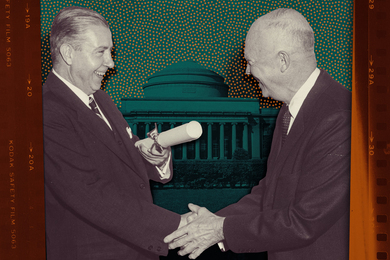J-PAL North America, a research center in MIT’s Department of Economics, announced new partnerships with five state and local governments across the United States.
The California Department of State Hospitals, Minnesota Board of Pharmacy, Minnesota State Court Administrator’s Office, Shasta County Superior Court, and Virginia Department of Social Services were selected to partner with J-PAL North America and its network of leading academic researchers through the J-PAL State and Local Innovation Initiative. These partnerships will develop randomized evaluations, also known as randomized controlled trials (RCTs), which have the potential to yield rigorous evidence about which programs and policies are most effective.
“We are thrilled to partner with these five state and local governments to address pressing policy problems across the country through rigorous evaluation,” says Mary Ann Bates, J-PAL North America executive director and co-chair of the State and Local Innovation Initiative. “We are particularly excited about how many of these projects will build on evidence from prior randomized evaluations to test if similar interventions can be effective in different settings.”
These proposals will examine a wide variety of topics and intervention methods, including reducing over-prescription of opioids, reducing failures to appear for arraignment, addressing homelessness and housing instability, and increasing the take-up of federal tax credits for low-income families.
In California, individuals with serious mental illness who face felony charges and are likely to be found incompetent to stand trial are directed to the Department of State Hospitals (DSH) to receive treatments to regain competency. DSH has launched a new Pre-trial Felony Mental Health Diversion program, through which approximately 20 counties will receive funding to divert individuals who are incompetent to stand trial out of the criminal justice system and into wrap-around community treatment services. DSH is partnering with J-PAL North America to evaluate the effects of the Pre-Trial Felony Mental Health Diversion program. This evaluation will contribute significant insight into how diverting those found to be incompetent to stand trial due to mental health reasons to community mental health services may impact their individual well-being, as well as broader outcomes in the criminal justice and behavioral health systems.
“The California Department of State Hospitals is pleased to partner with J-PAL to evaluate how Felony Mental Health Diversion impacts individuals living with serious mental illness in California,” says Stephanie Clendenin, director of the California Department of State Hospitals. “The Felony Mental Health Diversion program seeks to provide long-term community mental health treatment and other services for individuals with serious mental illness so that they avoid criminalization and institutionalization and receive the critical mental health care and supportive services they need.”
While the opioid prescribing rate among physicians has declined in recent years, the number of opioids prescribed per person remains three times higher than in 1999. Many states are testing interventions to reduce the overprescription of opioids among physicians. The Minnesota Board of Pharmacy and Minnesota Management and Budget will partner with J-PAL North America to identify ways to increase the use of Minnesota’s prescription monitoring program (PMP) and measure the impact of that increased use on prescribers’ rate of controlled-substance prescriptions. The PMP database maintains a secure record of all controlled-substance prescriptions, and more frequent use of the database may help avoid prescribing to individuals misusing opioids and, instead, allow prescribers to make referrals to treatment services.
"We are excited about this innovative partnership that will help Minnesota use data to increase the use of Prescription Monitoring Programs and reduce overprescribing of opioids,” says Myron Frans, commissioner of Minnesota Management and Budget. “The opioid crisis has caused tremendous damage to our families and communities. To achieve better results, we will continue to collaborate and use evidence-based governing principles to combat this crisis.”
“The Minnesota Board of Pharmacy looks forward to working with Minnesota Management and Budget and J-PAL to evaluate our PMP, with the aim to increase use of the PMP and to analyze its impact on controlled substance prescription rates,” says Cody Wiberg, executive director of the Minnesota Board of Pharmacy.
In 2017, Minnesota’s largest county piloted a text reminder program for individuals with court hearings; after promising results suggested the reminders increased court appearances, the Minnesota Judicial Branch decided to make these e-reminders available statewide. The Minnesota State Court Administrator’s Office is now working with Minnesota Management and Budget and J-PAL North America to test the content and timing of different messages to determine which behavioral strategies are most effective in reducing failures to appear for court hearings. Previous research suggests that behavioral nudges, like text messages and redesigned summons, can reduce failure-to-appears for criminal hearings. This evaluation will measure the effectiveness of different message content and whether these reminders can also be effective for increasing court appearances among tenants facing eviction proceedings.
“Hearing eReminders are about keeping the justice system, and those within it, from incurring additional costs. We are focused on keeping the court process moving efficiently, because we know that justice delayed is justice denied,” says Minnesota State Court Administrator Jeff Shorba. “We have already seen from the 18-month pilot that parties who received some form of Hearing eReminder were 35 percent more likely to appear for their hearing. Rigorous evaluation of Hearing eReminder messages and sequencing will ensure we are delivering the most effective messages on the most impactful schedule.”
Similarly, in Shasta County, California, individuals who commit low-level offenses receive court summonses that require offenders to appear in court. Failure to appear in court results in the issuance of an arrest warrant, which is costly for the criminal justice system and recipients. The Shasta County Superior Court will partner with J-PAL North America to evaluate behavioral interventions to reduce defendants’ failure to appear at arraignments. This evaluation will expand the previous literature on reducing failures to appear and provide insight into the effectiveness of these interventions in a different setting.
“The Shasta County Superior Court is excited to join with J-PAL to analyze strategies that could help reduce the incidence of homeless individuals failing to appear to in court,” says Melissa Fowler-Bradley, court executive officer of the Shasta County Superior Court. “In Shasta County, about one-third of the people who fail to appear for their court cases are homeless, and similar statistics exist throughout the country. Unfortunately, a failure to appear has an added impact on those who are economically challenged. The Shasta County Superior Court’s goal is to reduce those failures to appear among the homeless population as much as possible using strategies that are proven effective through the rigorous evaluation made possible by J-PAL. A successful project created under this state and local initiative could have nationwide impact, improve the plight of the impoverished, and increase the efficiency of the criminal justice system.”
Millions of dollars of the Earned Income Tax Credit (EITC), a federal tax credit for low-income households, go unclaimed every year. Previous research suggests that behavioral interventions, like messages and simplified materials, can increase the uptake of the EITC. The Virginia Department of Social Services will partner with J-PAL North America to develop an evaluation of a text-messaging intervention to generate higher rates of tax filing and EITC claims. This evaluation will add to the growing body of literature on behavioral interventions to increase EITC claims.
“This new partnership with J-PAL is an opportunity to transform how we pursue our mission of triumphing over poverty, abuse, and neglect,” says Duke Storen, commissioner of the Virginia Department of Social Services. “We will gain valuable insight from the RCT about how to more effectively encourage eligible Virginians to claim the EITC, which has been found to be one of the most effective federal antipoverty programs. We anticipate the results of this work will not only improve how we communicate with our customers as it relates to the EITC and the full-spectrum of our programs and services, but will prove to benefit other states as well.”
The California Department of State Hospitals, Minnesota Board of Pharmacy, Minnesota State Court Administrator’s Office, Shasta County Superior Court, and Virginia Department of Social Services join 13 state and local governments selected through previous rounds of the J-PAL State and Local Innovation Initiative: Baltimore, Maryland; King County, Washington; Minneapolis, Minnesota; Philadelphia, Pennsylvania; Rochester, New York; Santa Clara, California; and Washington; the states of California, Washington, Massachusetts, Pennsylvania, New Mexico, and South Carolina; and the U.S. territory of Puerto Rico. These state and local governments are part of a growing movement to use evidence to improve the effectiveness of policies and programs and ultimately the lives of people experiencing poverty.
Anyone wishing to learn more about the initiative or to receive updates about its progress is invited to visit online. The J-PAL contact for more information is Initiative Manager Rohit Naimpally.









